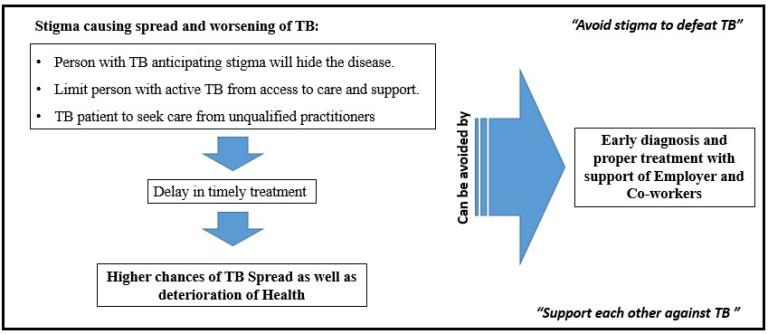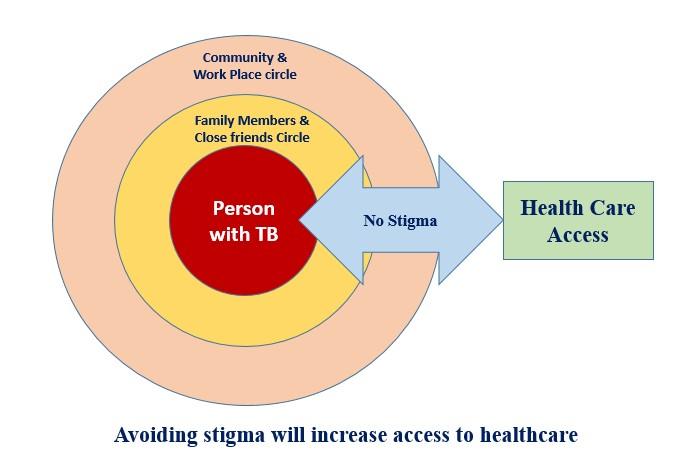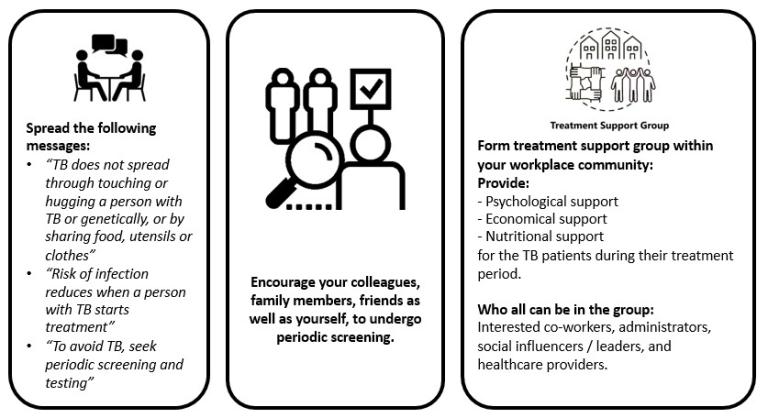Content Status
Type
Linked Node
Stigma & Discrimination at workplaces, and Wage Loss leading to Poverty
Learning ObjectivesHow to avoid Stigma & Discrimination related to TB
What’s inside:
Read this page to learn how stigma & discrimination due to TB can lead to late diagnosis, disease spread and decrease the health & wellbeing of an employee affected with active TB disease.
TB related Stigma & Discrimination at workplaces, and Wage Loss affecting the Employee
People affected by TB lose jobs, go into debt and face considerable stigma from their families, community and employers. Thus, the impact of TB on individuals is often all- encompassing, affecting not only physical health, but also social, economic, and psychological well-being.
If the employer & co-workers are showing stigma and discrimination to the employee diagnosed with TB, it can cause:
-
Loss of employment
-
Lower Income
Added to the social consequences such as:
- Ostracism from family and community
-
Divorce
-
Loss of housing
-
Depression, Higher levels of anxiety
-
Lower Life Satisfaction
Since TB affects the economically productive age group, the social consequences mentioned above will be huge.
Many employees are migrants at their place of work and may be dependent on the employer, and on co-workers, for health care needs.


To initiate and complete treatment successfully, and to prevent the spread of the disease in the community, TB patients and their families need the understanding, empathy, and support of employers and co-workers.
Four principles to prevent or reduce consequences of stigma:
1. People diagnosed with TB and those who are close to them are able to live and acess TB services without being judged.
2. People in the social circle / members of the community of the person diagnosed with TB do not fear TB but are assured that it is a treatable disease, and that their support of persons with TB will result in early and better recovery, and thus prevent its transmission to others.
3. Community influencers contribute to fostering of safe and acceptable environments towards people diagnosed by TB and thier close contacts.
4. Healthcare providers and health influencers adopt standards for TB care and their capacity in using stigma-mitigating soft-skills and language is built.

Steps you can take to avoid stigma and discrimination against TB in your community and workplace:
- Providing awareness:
- Against fear of TB.
- Regarding the curability of the disease
- Need of avoiding stigma and discrimination.
- On advantages of early diagnosis and need of treatment adherence
- Advocating for undergoing periodic TB screening
- Providing extensive psycological, economical and nutritional support to TB patients and their family
- Ensuring that your workplace is having a policy or guidelines against stigma and discrimination especially related to TB and HIV.

Recommendations for the employer:
-
Conduct periodic health screening camps specifically for TB in your workplace
-
Ensure HR support to employee diagnosed with TB by providing sick leave / paid leave during the treatment period.
-
Allot flexible work hours during the recovering period. Consider provision of work from home if the circumstances allow.
-
Introduce “TB FREE WORKPLACE” policy in your organization

Content Creator
Reviewer
- Log in to post comments
Comments
TB related Stigma &…
MidhunR Fri, 05/08/2022 - 15:03
TB related Stigma & Discrimination at workplaces, and Wage Loss leading to Poverty:
People affected by TB lose jobs, go into debt and face considerable stigma from their families, community and employers. Thus, the impact of TB on individuals is often all- encompassing, affecting not only physical health, but also social, economic, and psychological well-being.
If the employer & co-workers are showing Stigma and Discrimination to the employee diagnosed with TB, it can cause:
Added to the social consequences such as:
Since TB affects the economically productive age group, the social consequences mentioned above will be huge.
Many employees are migrants at their place of work and may be dependent on the employer, and on co-workers, for health care needs.
To initiate and complete treatment successfully, and to prevent the spread of the disease in the community, TB patients and their families need the understanding, empathy, and support of employers and co-workers.
Steps you can take to avoid stigma and discrimination against TB in your community and workplace:
Recommendations for the employer: